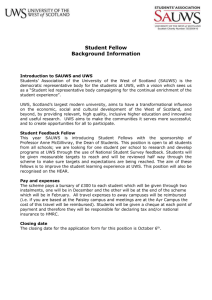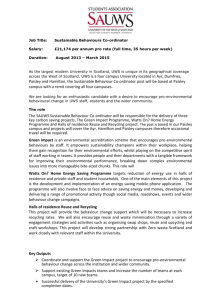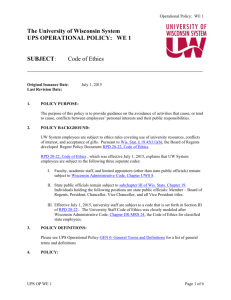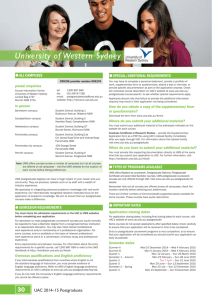Knowledge, skills and experience matrix of The University of
advertisement
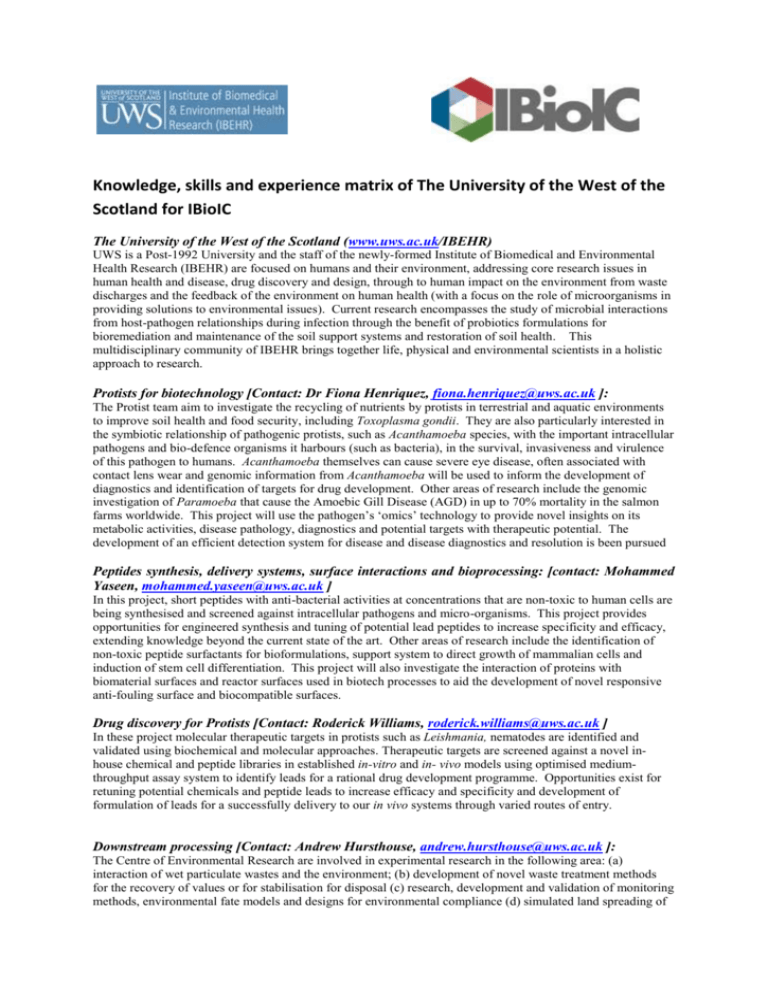
Knowledge, skills and experience matrix of The University of the West of the Scotland for IBioIC The University of the West of the Scotland (www.uws.ac.uk/IBEHR) UWS is a Post-1992 University and the staff of the newly-formed Institute of Biomedical and Environmental Health Research (IBEHR) are focused on humans and their environment, addressing core research issues in human health and disease, drug discovery and design, through to human impact on the environment from waste discharges and the feedback of the environment on human health (with a focus on the role of microorganisms in providing solutions to environmental issues). Current research encompasses the study of microbial interactions from host-pathogen relationships during infection through the benefit of probiotics formulations for bioremediation and maintenance of the soil support systems and restoration of soil health. This multidisciplinary community of IBEHR brings together life, physical and environmental scientists in a holistic approach to research. Protists for biotechnology [Contact: Dr Fiona Henriquez, fiona.henriquez@uws.ac.uk ]: The Protist team aim to investigate the recycling of nutrients by protists in terrestrial and aquatic environments to improve soil health and food security, including Toxoplasma gondii. They are also particularly interested in the symbiotic relationship of pathogenic protists, such as Acanthamoeba species, with the important intracellular pathogens and bio-defence organisms it harbours (such as bacteria), in the survival, invasiveness and virulence of this pathogen to humans. Acanthamoeba themselves can cause severe eye disease, often associated with contact lens wear and genomic information from Acanthamoeba will be used to inform the development of diagnostics and identification of targets for drug development. Other areas of research include the genomic investigation of Paramoeba that cause the Amoebic Gill Disease (AGD) in up to 70% mortality in the salmon farms worldwide. This project will use the pathogen’s ‘omics’ technology to provide novel insights on its metabolic activities, disease pathology, diagnostics and potential targets with therapeutic potential. The development of an efficient detection system for disease and disease diagnostics and resolution is been pursued Peptides synthesis, delivery systems, surface interactions and bioprocessing: [contact: Mohammed Yaseen, mohammed.yaseen@uws.ac.uk ] In this project, short peptides with anti-bacterial activities at concentrations that are non-toxic to human cells are being synthesised and screened against intracellular pathogens and micro-organisms. This project provides opportunities for engineered synthesis and tuning of potential lead peptides to increase specificity and efficacy, extending knowledge beyond the current state of the art. Other areas of research include the identification of non-toxic peptide surfactants for bioformulations, support system to direct growth of mammalian cells and induction of stem cell differentiation. This project will also investigate the interaction of proteins with biomaterial surfaces and reactor surfaces used in biotech processes to aid the development of novel responsive anti-fouling surface and biocompatible surfaces. Drug discovery for Protists [Contact: Roderick Williams, roderick.williams@uws.ac.uk ] In these project molecular therapeutic targets in protists such as Leishmania, nematodes are identified and validated using biochemical and molecular approaches. Therapeutic targets are screened against a novel inhouse chemical and peptide libraries in established in-vitro and in- vivo models using optimised mediumthroughput assay system to identify leads for a rational drug development programme. Opportunities exist for retuning potential chemicals and peptide leads to increase efficacy and specificity and development of formulation of leads for a successfully delivery to our in vivo systems through varied routes of entry. Downstream processing [Contact: Andrew Hursthouse, andrew.hursthouse@uws.ac.uk ]: The Centre of Environmental Research are involved in experimental research in the following area: (a) interaction of wet particulate wastes and the environment; (b) development of novel waste treatment methods for the recovery of values or for stabilisation for disposal (c) research, development and validation of monitoring methods, environmental fate models and designs for environmental compliance (d) simulated land spreading of newspaper de-inking sludge (e) metal migration and buffering capacity of process by products from steel making (f) migration of metals in urban soils (g) large scale demonstration of groundwater/soil remediation for metal and organic pollutants (h) nitrate transport processes in diffuse pollution. Metagenomics for Biotechnology [Contact: Roderick Williams, roderick.williams@uws.ac.uk ] The metagenomics team aims to apply ‘omics’ technologies on soil biomes to identify novel biocatalyst for destroying toxic environmental contaminants (in soils, waste water, municipal and industrial wastes) to improve soil health and water quality respectively. The role of surfactant-induced changes in the cellular metabolic pathways in our model metal-resistant prokaryotic lines and the bioavailability of contaminants in soils to these microbes is also been investigated using culture-based techniques, metallomics and metabolomics technologies. These projects will inform the development of ‘designer’ microbes with enhanced contaminant-degradation potential and original research underpinning microbial specialisation in the habitat of concern and formulation development. The development of suitable delivery systems for these microbes or their recombinant gene products to contaminated soil is being explored.


